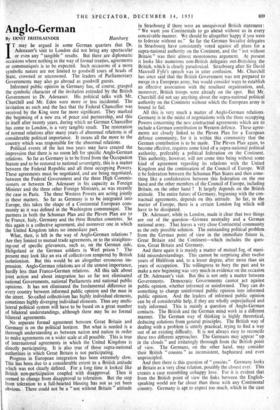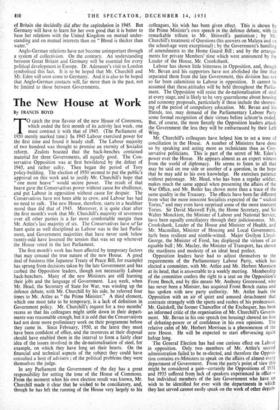Anglo-German
IT may be argued in some German quarters that Dr. Adenauer's visit to London did not bring any spectacular or even any " tangible " results. But there are diplomatic occasions where nothing in the way of formal treaties, agreements or communiqués is to be expected. Such occasions of a more symbolic nature are not limited to goodwill tours of heads of State, crowned or uncrowned. The leaders of Parliamentary Governments may also go abroad as goodwill guests. - Informed public opinion in Germany has, of course, grasped the symbolic character of the invitation extended by the British Government to Dr. Adenauer. His political talks with Mr.
Churaill and Mr. Eden were more or less incidental. The invitation as such and the fact that the Federal Chancellor was received by the King were far more significant. they marked the beginning of a new era of peace and partnership, and this in itself after twenty years, during which no German Chancellor has come to London, is a very tangible result. The restoration of normal relations after many years of abnormal relations is of considerable political importance. It means all the more to the country which was responsible for the abnormal relations. Political events of the last two years may have created the impression that there is no room left for specific Anglo-German relations. So far as Germany is to be freed from the Occupation Statute and to be restored to national sovereignty, this is a matter between the Federal Republic and all three occupying Powers. These agreements must be negotiated, and are being negotiated, between the Federal Government and the three High Commis- sioners or between Dr. Adenauer in his capacity as Foreign Minister and the three other Foreign Ministers, as was recently the case in Paris. The three Western Powers are acting jointly in these matters. So far as Germany is to be integrated into Europe, this takes the shape of a Continental European com- munity as it was defined in the Washington communiqué. The partners in both the Schuman Plan and the Pleven Plan are to be France, Italy, Germany and the three Benelux countries. So this again is a collective agreement, and moreover one in which the United Kingdom takes no immediate part. What, then, is left in the way of Anglo-German relations ? Are they limited to mutual trade agreements, or to the straighten- ing-out of specific grievances, such as, on the German side, Heligoland or the German soldiers in Werl prison ? The present may look like an era of collectivism tempered by British isolationism. But this would be an altogether . erroneous im- pression. Anglo-German relations are of the utmost importance, hardly less than Franco-German relations. All this talk about joint action and about integration has so far not eliminated national Governments, national Parliaments and national public opinions. It has not eliminated the fundamental difference in every country between informed public opinion and the man in the street. So-called collectivism has highly individual elements, sometimes highly diverging individual elements. Thus any ntulti- lateral political system will have to be based on a great number of bilateral understandings, although there may be no formal bilateral agreements. No separate formal agreement between Great Britain and Germany is on the political horizon. But what is needed is a thorough understanding as between nation and nation in order to make agreements on a wider scale at all possible. This is true of international agreements in which the United Kingdom is directly participating. It is also true of those supra-national authorities in which Great Britain is not participating.
Progress in European integration has been extremely slow. This has been due to a considerable extent to a British attitude which was not clearly deffned. For a long time it looked like British non-participation coupled with disapproval. Then it seemed to change from disapproval to toleration. But the step from toleration- to a full-hearted blessing has not as yet been obvious. There could not be a "not without Britain" attitude , In Strasbourg if there were an unequivocal British statement: "We want you Continentals to go ahead without us in every conceivable manner. We should be altogether happy if you were to federate without us." So far the German Socialist delegates in Strasbourg have consistently voted against all plans for a supra-national authority on the Continent, and the "not without Britain" was their almost monotonous argument. At present it looks like numerous non-British delegates out-Britishing the British, which is clearly paradoxical. Strasbourg after Sir David Maxwell Fyfe's speech was in utter confusion. Mr. Churchill has since said that the British Government was not prepared to merge in a European army, but would considef ways to establish an effective association with the resultant organisation, and, moreover, British troops were already on the spot. But Mr. Churchill did not say anything about the supra-national political authority on the Continent without which the European army is bound to fail.
All this is very much a matter. of Anglo-German relations. Germany is in the midst of negotiations with the three occupying Powers concerning the new contractual agreements which are to include a German contribution to Western defence. These agree- ments are closely linked to the Pleven Plan for a European defence community, for it is within this community that the German contribution is to be made. The Pleven Plan again, to become effective, requires some kind of a supra-national political authority, preferably a political federation on the Continent. This authority, however, will not come into being without some kind of agreement regarding its relations with the United Kingdom and the continuation of the Council of Europe. Will it be federation between the Schuman Plan States and then some- thing like a confederation between this federation on the one hand and the other members of the Council of Europe, including Britain, on the other hand ? It largely depends on the British attitude. The entire future of Germany, beginning with the con- tractual agreements, depends on this attitude. So far, in the matter of Europe, there is a certain London fog which will have to be dissipated.
Dr. Adenauer, while in London, made it clear that two things are out of the question—German neutrality and a German national army. That leaves a very close Continental community as the only possible solution. The outstanding political problem from the German point of view in the immediate future is,, Great Britain and the Continent—which includes the ques- tion, Great Britain and Germany.
And there again it is mainly a matter of mutual fog, of mani- fold misunderstandings. This cannot be surprising after twelve years of Hitlerism and, to a lesser degree, after more than six years of occupation. The willingness to bury the past and to make a new beginning was very much in evidence on the occasion of Dr. Adenauer's visit. But this is not only a matter between Governments. Democratic Governments cannot act against public opinion, whether informed or uninformed. They can do something to change uninformed public opinion into informed public opinion. And the leaders of informed public opinion can be of considerable help, if they are wholly unprejudiced and truly informed. This is mainly a question of Anglo-German contacts. The British and the German mind work in a different manner. The German way of thinking is highly theoretical, deducing solutions from general principles. The British way of dealing with a problem is utterly practical, trying to find a way out of an existing difficulty. It is not always easy to reconcile these two different approaches. The Germans may appear "up in the clouds" and irritatingly thorough from the British point of view. The Germans, on the other hand, may consider their British " cousins " as inconsistent, haphazard and even unprincipled. And then there is this question of "cousins." Germany looks at Britain as -a very close relation, possibly the closest ever. This creates a case resembling unhappy love. For it is evident that from the British point of view the links between the English- speaking world are far closer than those with any Continental country. Germany is apt to expect too much, which in the case of Britain she decidedly did after the capitulation in 1945. But Germany will have to learn for her own good that it is better to base her relations with the United Kingdom on mutual under- standing and on mutual interests than on "Blood is thicker than water." Anglo-German relations have not become unimportant through a system of collectivism. On the contrary. An -understanding between Great Britain and Germany will be essential for every political development in Europe. Dr. Adenauer's visit to London symbolised this fact. It is to be hoped that Mr. Churchill and Mr. Eden will soon come to Germany. And it is also to be hoped that Anglo-German contacts will, far more than in the past, not be limited to those between Governments.







































 Previous page
Previous page